Best Used Car, Services, Auto Parts, Rent Car Available for Buy and Sell Near By Go Ahead
- Emerging Trends in Farm Equipment for 2025
- Best Tractors in India 2025: Top 10 Picks for Every Farm Size
- 2025 Agricultural Forecast: Key Trends and Predictions for Crop Production in India
- Swaraj Price 2025: Latest Swaraj Tractor Price List and On-Road Rates in India
- महिंद्रा मिनी ट्रैक्टर - कीमत, मॉडल, और सुविधाएँ
- New Holland 3630 TX Super Plus+ Tractor Review 2025: Features, Price and Performance
- Mini Tractors in India - Features, Prices, and the Best Options
- महाराष्ट्र फार्मर आयडी: ऑनलाइन नोंदणी प्रक्रिया, कागदपत्रे आणि फायदे
- Sonalika Tractor Price 2025 Complete List of Models, Series and Latest Offers
- Full Review of New Holland 3600-2 TX All Rounder Plus Tractor: Features, Price and Performance
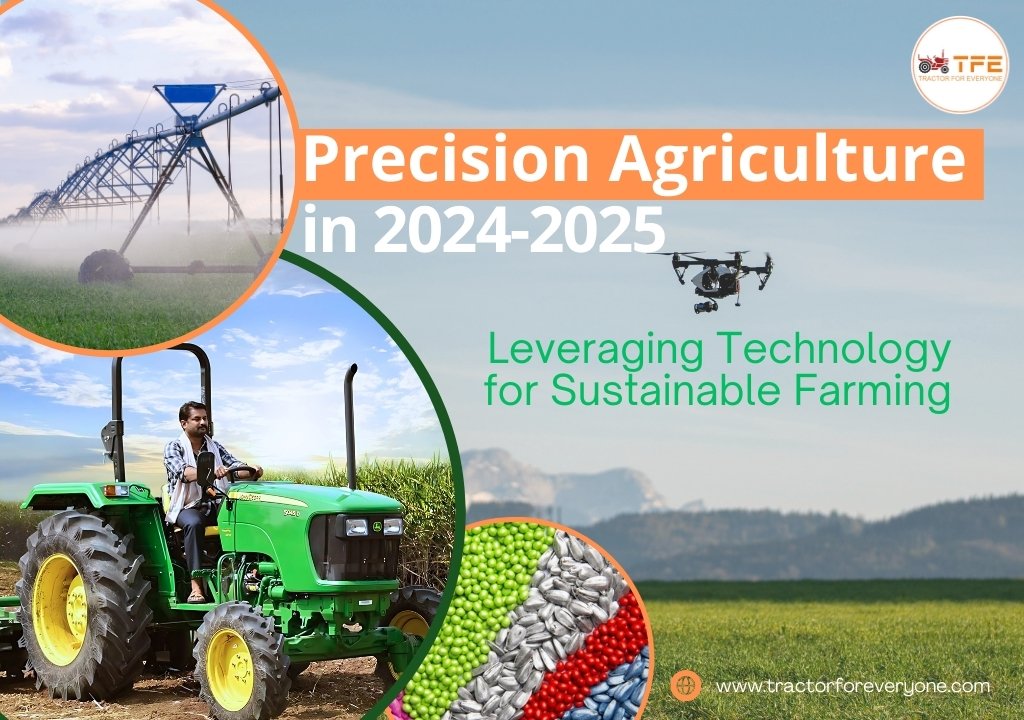
Precision Agriculture in 2024-25: Leveraging Technology for Sustainable Farming
Agriculture in India has traditionally relied on intensive labor, generalized practices, and conventional wisdom, but the rise of precision agriculture is transforming this landscape. Precision agriculture, a method that utilizes technology to manage farm resources efficiently, has emerged as a sustainable and productive solution for farmers across the country. In 2024, advancements in GPS, IoT sensors, drones, and big data analytics are giving farmers the tools they need to make data-driven decisions, optimize resource use, and enhance crop yields—all while reducing environmental impact.
This article explores the benefits of precision agriculture, the role of technology, and its impact on farming in India, illustrating why it is essential for building a resilient and sustainable agricultural sector.
What is Precision Agriculture?
Precision agriculture, or precision farming, refers to the use of technology to monitor and manage crop growth at a micro level, rather than a broad approach. This technology-driven farming method includes gathering data on crop health, soil conditions, and weather to make well-informed decisions on irrigation, fertilization, and pest control. The primary goal of precision agriculture is to improve resource efficiency, minimize waste, and enhance productivity, ultimately supporting more sustainable farming practices.
According to the National Bank for Agriculture and Rural Development (NABARD), adopting precision agriculture could increase productivity by 20-25% and reduce water use by nearly 30%. For a country like India, where small and marginal farmers constitute over 85% of the farming community, the benefits of precision agriculture could be transformative.
Key Technologies in Precision Agriculture
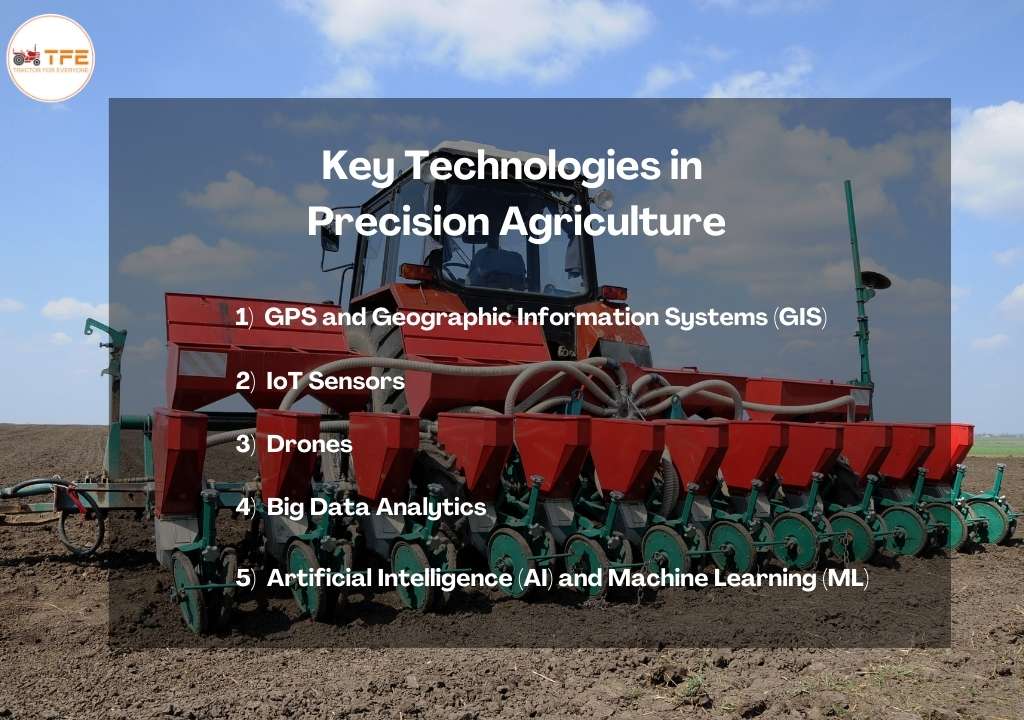
GPS and Geographic Information Systems (GIS)
GPS technology allows farmers to map their fields accurately, segmenting them into smaller, manageable zones based on soil type, crop requirements, and other variables. Using GIS, farmers can monitor and record data about each specific area, enabling them to customize their farming practices. For example, farmers can vary their fertilizer application rates based on the specific nutrient needs of different areas within their fields. This targeted approach enhances yield and minimizes chemical waste, reducing soil degradation over time.
IoT Sensors
Internet of Things (IoT) sensors are a cornerstone of precision agriculture, as they provide real-time data on soil moisture, temperature, pH levels, and nutrient content. These sensors, placed across a field, send data to a central system, allowing farmers to monitor crop and soil health in real-time. IoT sensors also play a critical role in automated irrigation, ensuring crops receive the optimal amount of water. For instance, Fasal, an Indian agri-tech startup, offers IoT-based precision farming solutions that help farmers reduce water consumption by up to 50%, a crucial advancement given India’s water scarcity challenges.
Drones
Drones are increasingly used in precision agriculture to survey fields, assess crop health, and even apply fertilizers and pesticides. Equipped with cameras and sensors, drones can capture high-resolution images of fields, identifying early signs of pest infestations, disease, or nutrient deficiencies. This timely detection allows farmers to address issues before they escalate, reducing crop loss and enhancing yield. Companies like Garuda Aerospace and Skylark Drones have been instrumental in providing affordable drone solutions for Indian farmers, promoting sustainable farming practices.
Big Data Analytics
Precision agriculture generates massive amounts of data from GPS systems, IoT sensors, and drones. Big data analytics helps process this information, identifying trends, patterns, and actionable insights. By analyzing data on weather, soil conditions, and crop performance, farmers can make informed decisions about planting cycles, crop rotation, and pest control. For example, CropIn Technology, an Indian agritech firm, uses big data and AI to provide farmers with tailored crop advisory services, improving their productivity by up to 30%.
Artificial Intelligence (AI) and Machine Learning (ML)
AI and ML algorithms enable farmers to predict outcomes based on historical data, optimize inputs, and identify areas for improvement. By analyzing historical crop performance and environmental factors, AI can guide farmers on optimal planting schedules, crop varieties, and pest management techniques. TartanSense, an Indian startup, has developed AI-powered robots that help farmers detect and treat weeds with precision, reducing chemical usage and promoting environmental sustainability.
Also Read: Sustainable Farming Practices: Adapting to Modern Challenges in Agriculture
Benefits of Precision Agriculture for Sustainable Farming
Optimized Resource Usage
Precision agriculture allows farmers to apply the right amount of resources—whether water, fertilizer, or pesticides—at the right time and place. This targeted approach conserves resources, reduces waste, and lowers costs. For example, precision irrigation driven by IoT sensors helps farmers reduce water usage by 30-50%, which is particularly valuable in drought-prone regions of India.
Enhanced Crop Yields and Quality
By monitoring soil health, moisture levels, and crop conditions, precision agriculture helps farmers address issues before they impact crop quality. The result is a higher yield and better-quality produce. According to a study by the Indian Council of Agricultural Research (ICAR), precision agriculture practices can increase crop yields by 10-15% and improve crop resilience against diseases.
Reduced Environmental Impact
Precision agriculture minimizes the use of chemical fertilizers and pesticides by applying them only where and when needed. This targeted application reduces the risk of soil and water contamination, promoting long-term soil health and sustainability. In addition, by reducing fuel usage and cutting down on unnecessary field operations, precision agriculture contributes to lowering greenhouse gas emissions.
Data-Driven Decision Making
The real-time data provided by precision agriculture technologies enable farmers to make informed decisions. With accurate data, farmers can predict crop performance, plan for adverse weather, and determine the best time for harvesting. This level of insight is invaluable, especially in a climate as variable as India’s, where unpredictable rainfall and rising temperatures frequently disrupt farming cycles.
Financial Benefits
Although the initial investment in precision agriculture technology may be high, the long-term savings from reduced resource usage and increased productivity can significantly boost a farmer's income. According to NABARD, precision agriculture could increase Indian farmers' incomes by 15-20% by optimizing inputs and improving crop yield.
Challenges and Barriers to Adoption in India
While precision agriculture holds great promise, there are still challenges in its widespread adoption, particularly for small-scale and marginal farmers in India.
High Initial Investment
Precision agriculture equipment, such as IoT sensors and drones, can be costly, making it difficult for small farmers to afford. Although government subsidies and financial assistance programs are available, more needs to be done to make these technologies accessible to all.
Limited Technical Knowledge
Many Indian farmers lack the technical knowledge required to operate and maintain precision agriculture tools. Training programs and educational initiatives are essential to bridge this knowledge gap. The government and private sector are beginning to offer digital literacy programs for farmers, but wider outreach is needed.
Inadequate Infrastructure
Precision agriculture relies heavily on internet connectivity, reliable electricity, and data storage. In many rural areas, infrastructure gaps hinder the effective use of technology, limiting the potential of precision agriculture. Strengthening rural connectivity and infrastructure is crucial for the successful implementation of these technologies.
Data Privacy and Security
Precision agriculture generates extensive data on crop health, field conditions, and farming practices. Ensuring data privacy and protecting farmers' information from unauthorized access is a growing concern, necessitating clear policies and secure systems.
Government Initiatives and Policies
The Indian government has been proactive in promoting precision agriculture through various schemes and initiatives. The Pradhan Mantri Fasal Bima Yojana (PMFBY) now incorporates satellite imagery and weather data to improve crop insurance accuracy, benefiting farmers directly. Additionally, under the Digital India initiative, the government is working on enhancing digital infrastructure in rural areas, making it easier for farmers to adopt precision farming.
State governments, too, are supporting precision agriculture. Karnataka, for example, launched the Karnataka Agriculture Mechanization and Precision Farming Project (KAMP), providing farmers with access to IoT devices and data-driven advisory services. Other states, including Maharashtra and Tamil Nadu, are also exploring similar programs to encourage precision farming.
The Future of Precision Agriculture in India
Precision agriculture is set to play a central role in transforming Indian agriculture. With growing government support, private sector innovations, and increasing awareness among farmers, the adoption of precision agriculture is expected to rise. Public-private partnerships, affordable technology solutions, and farmer training programs will be key to ensuring that precision agriculture reaches small and marginal farmers.
In 2024, precision agriculture is no longer just an option but a necessity for sustainable and productive farming in India. By leveraging technology, Indian farmers can improve their income, reduce their environmental footprint, and contribute to the nation’s food security. Precision agriculture offers a path forward for Indian agriculture—one that is data-driven, efficient, and sustainable, ensuring that Indian farms can thrive for generations to come.
Write a Comment
Popular Blogs
-
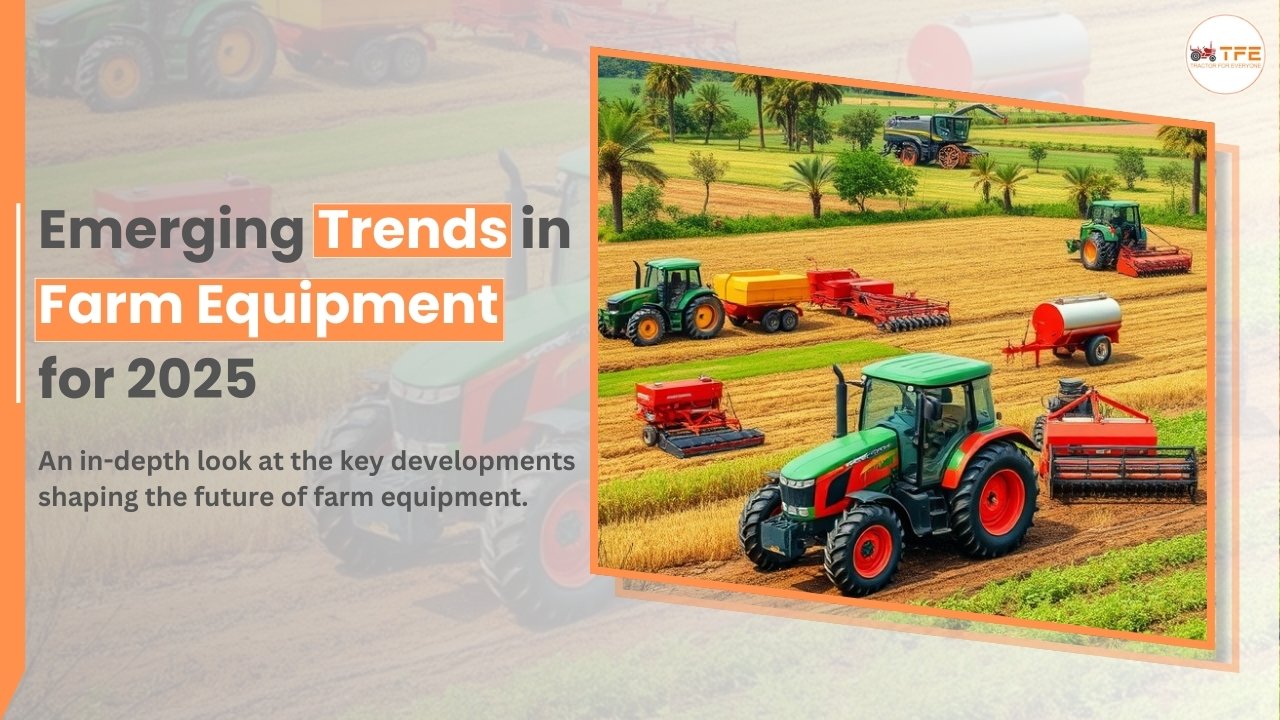
Emerging Trends in Farm Equipment for 2025
12/12/2024, POSTED BY ADMIN -

Best Tractors in India 2025: Top 10 Picks for Every Farm Size
05/29/2025, POSTED BY ADMIN -
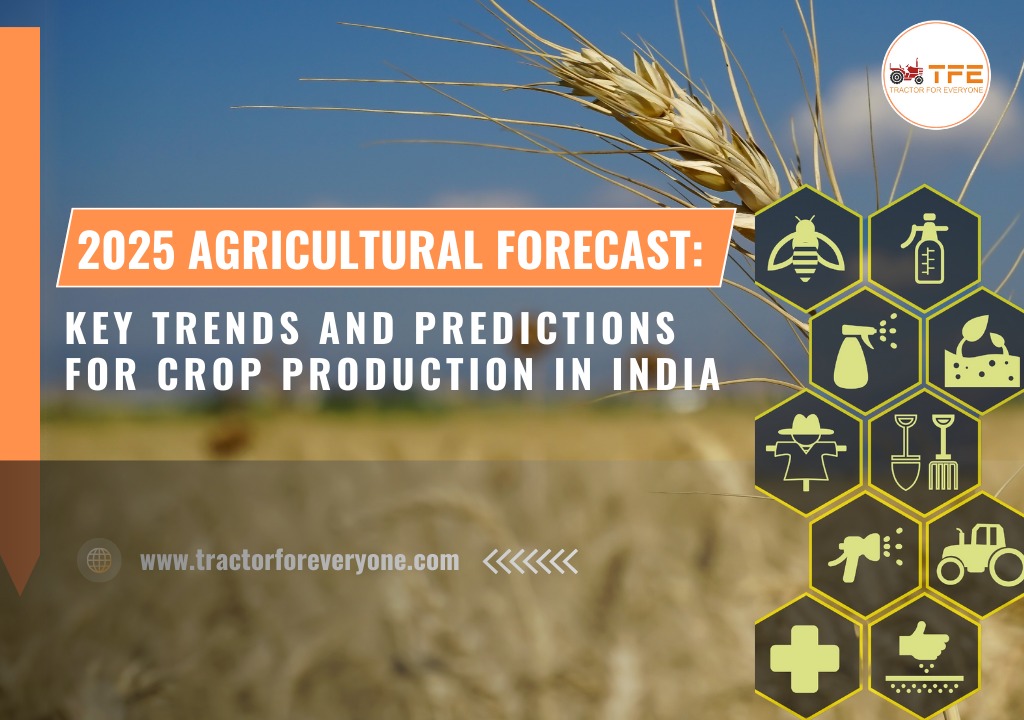
2025 Agricultural Forecast: Key Trends and Predictions for Crop Production in India
12/11/2024, POSTED BY ADMIN -

Swaraj Price 2025: Latest Swaraj Tractor Price List and On-Road Rates in India
07/24/2025, POSTED BY ADMIN -
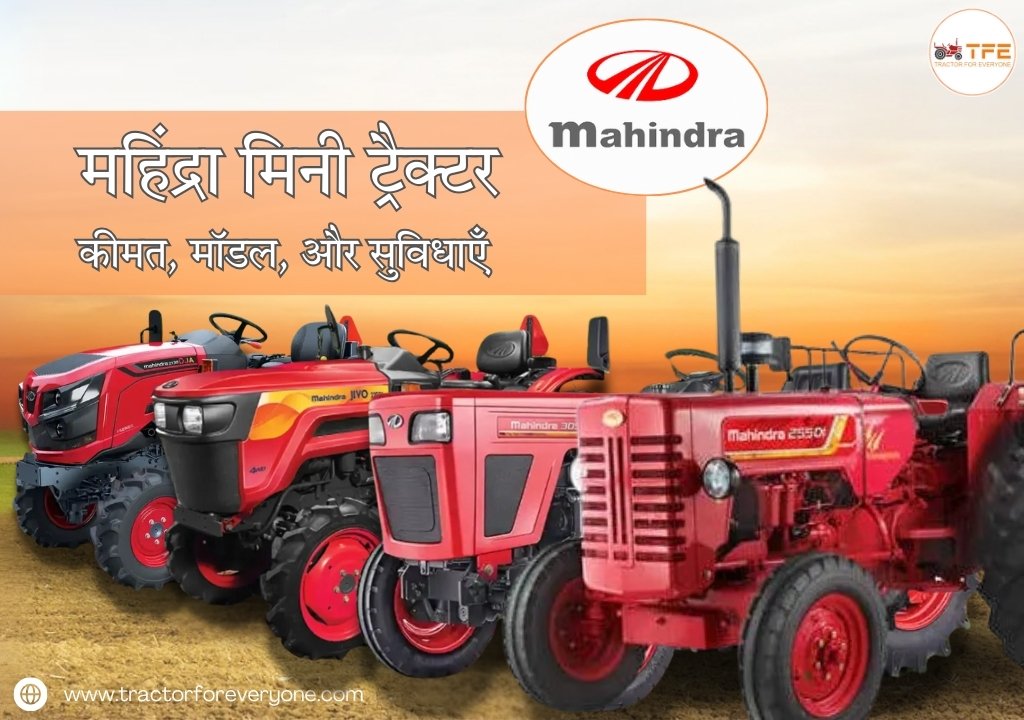
महिंद्रा मिनी ट्रैक्टर - कीमत, मॉडल, और सुविधाएँ
02/18/2025, POSTED BY ADMIN

